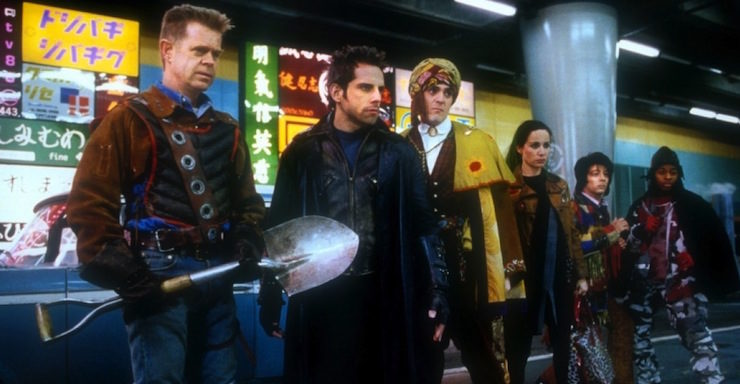Both Mystery Men and The League of Extraordinary Gentlemen were movies based on comic books that riffed on the concept of superhero teams. The former bore only a passing resemblance to the team that showed up in Flaming Carrot Comics, and it took a more direct satirical approach than the surrealist satire of Bob Burden’s various comics series.
The latter gave the Avengers/Justice League treatment to various late-19th-century literary heroes. The only ones that were in both the Alan Moore/Kevin O’Neill comic and in the film were Allan Quatermain, Mina Harker (née Murray), Jekyll & Hyde, Captain Nemo, and Professor Moriarty. (A different invisible man was used, and Fu Manchu dropped, both due to rights issues.)
Neither film was a huge success, though one of them really should have been.
Flaming Carrot Comics was a weird-ass sendup of superheroes by Burden that has appeared sporadically since 1979. It stars a guy who wears a mask in the shape of a giant flaming carrot, and who says, “Ut!” a lot. It was revealed in flashback that he was part of a group called the Mystery Men, and in 1999, the Mystery Men were adapted into their own feature film (not featuring the Flaming Carrot, more’s the pity).
Alan Moore and the WildStorm Comics imprint of Image formed America’s Best Comics in 1999, and their flagship title was The League of Extraordinary Gentlemen. After doing a couple of miniseries, WildStorm was purchased by DC Comics. Moore had sworn never to work for DC again, but he continued the imprint for a time, eventually bringing it to a close. LEG was moved over to Top Shelf and Knockabout Comics.
The 2003 adaptation of LEG was the last film ever adapted from a Moore comic that had Moore’s name on it. Having been dissatisfied with the experiences of both From Hell and this being adapted, he refused to have his name on V for Vendetta or Watchmen, nor to accept any money for the adaptations.
It was also Sean Connery’s swan song. After playing Allan Quatermain in this film, he retired from acting (though he has done some voiceover work since). Allegedly, Connery took the role of Quatermain because he’d turned down appearing as Gandalf in the Lord of the Rings films, a decision he regretted once those movies became big hits. One wonders what that alternate universe looks like…
“We’ve got a blind date with destiny and it looks like she’s ordered the lobster!”
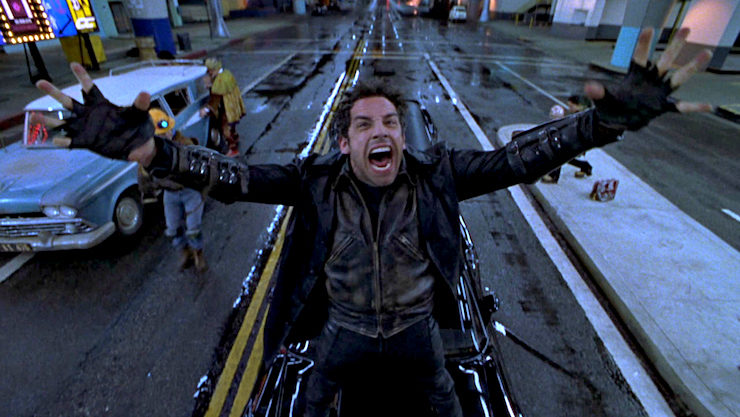
Mystery Men
Written by Neil Cuthbert
Directed by Kinka Usher
Produced by Lawrence Gordon, Lloyd Levin, & Mike Richardson
Original release date: August 6, 1999
In Champion City, the Red Eye Gang attacks a nursing home. Three superheroes—the Blue Raja, who throws forks with inconsistent accuracy; the Shoveler, who speaks softly and carries a big shovel; and Mr. Furious, who, um, gets mad a lot—try and fail to stop the gang. Then Captain Amazing shows up, and he dispatches them with ease.
After semi-politely blowing off the three lesser heroes, Captain Amazing speaks briefly to the press, and does a terrible job of pretending to be nice to his adoring public, who still adore him anyhow. He gets into his limo with his publicist, and laments that all the good supervillains are dead or in jail, so he’s reduced to saving old people from idiots. He’s already lost Pepsi as a sponsor, and he’s worried he’ll lose more endorsements if he doesn’t do something spectacular.
One of his most challenging foes was Casanova Frankenstein, who’s been imprisoned in an insane asylum for twenty years. He’s up for parole, and Amazing decides that the villain needs to be free so he can get a good win. In his secret identity as billionaire Lance Hunt, he speaks before the parole board. While Hunt claims to be fine with keeping Casanova in prison, he has a note from Amazing saying that he deserves a second chance. Casanova’s shrink also agrees, and he’s freed.
Furious, Shoveler, and Raja lick their wounds in their favorite diner. Furious is unhappy about having to share credit with Amazing, never mind that he’s the only one who accomplished anything. He also snaps at the new server, who is unaffected by his rudeness. (Furious is also convinced that Hunt and Amazing are one and the same. Raja and Shoveler think he’s crazy.)
While Shoveler and Raja go home, the former to his wife and kids, the latter to where he lives with his mother (and we learn that his British accent is fake), Furious sees the Disco Boys, Casanova’s chief henchmen, and learns that Casanova is out.
The next morning, Furious reports to work at a junkyard, late. He’s tasked with junking an armored truck.
Amazing confronts Casanova, and while he’s ready for most of Casanova’s gadgets, he falls for a simple chloroform-delivering doodad that knocks him out. Furious sees that Amazing is captured, and he and the other two try to rescue him, but never get past the front door. As they recover in the diner, they agree that they need to find more superheroes and expand their roster. Furious also apologizes to the server, Monica, for being so scary, though she says he wasn’t scary at all. He also takes a shot at flirting with her, which almost works.
Shoveler introduces the team to Invisible Boy, who can only turn invisible when no one is looking at him. Furious and Raja are dubious, but Shoveler insists. The Spleen also more or less forces himself onto the team—his power is particularly brutal farts—and then they hold open tryouts at Shoveler’s house. None of the candidates are of much use—except for one late arrival, the Bowler, a young woman who has a possessed bowling ball. Her father was also known as the Bowler, but he was killed by one of the Disco Boys, and now his spirit inhabits his Goth daughter’s bowling ball. Except for Furious, everyone is happy to have her on the team.
They take a shot at Casanova, but while they succeed in damaging his car, they don’t really do anything of substance to him or the Disco Boys. They are also almost shot to death by the aforesaid Disco Boys, but they’re saved by the Sphinx, an older hero who offers to train them.
The training seems to go well at first, though Furious thinks it’s all nonsense, and he quits the team in a huff.
With Amazing out of action, criminals have come out of the woodwork, and Casanova gathers them at his headquarters. He plans to kill Amazing publicly and destroy Champion City.
Furious eats alone at the diner, where Monica convinces him to rejoin the team. He does so, after the team has stocked up on non-lethal weaponry from Dr. Heller, a brilliant scientist they met at the nursing home. (He was there to pick up chicks.)
Each team member says goodbye to their loved ones before they attack Casanova. Shoveler’s wife threatens to leave him, as she’s tired of him risking his life. Raja reveals to his mother that he’s a superhero. Furious says his goodbyes to Monica, who convinces him to be himself, to be Roy, not Mr. Furious. This, unfortunately, prompts a crisis in confidence, and Furious starts to wimp out.
Furious, Bowler, and Raja find Amazing, who is bitter and angry and too busy being obnoxious and condescending to give proper instructions on how to free him. As a result, Raja throws the wrong toggle, and accidentally kills Amazing rather horribly. The team panics, and even Sphinx suggests running away, but Shoveler gives a pep talk, and they renew their assault. Between their meagre superpowers and Heller’s weapons, they take care of the various criminals Casanova has gathered. Bowler kills the Disco Boy who killed her father (after which she says to her father’s spirit that now that his vengeance is fulfilled, she’s going back to grad school—that was the deal).
Unfortunately, Casanova has taken Monica hostage. This angers Furious to the point that he finally gives in to his rage and engages in fisticuffs with Casanova, eventually tossing him into the device that killed Amazing and will destroy Champion City. Bowler uses the bowling ball to destroy the machine, saving the city. The heroes stumble out of the now-destroyed headquarters, identifying themselves for the media, but unable to come up with a name for themselves. (Invisible Boy suggests “Super Dudes,” but that is soundly rejected by the others.) Heller is thrilled to see his team on TV after they’ve won the day.
“Eyes open, boy, I can’t protect you all the time!”
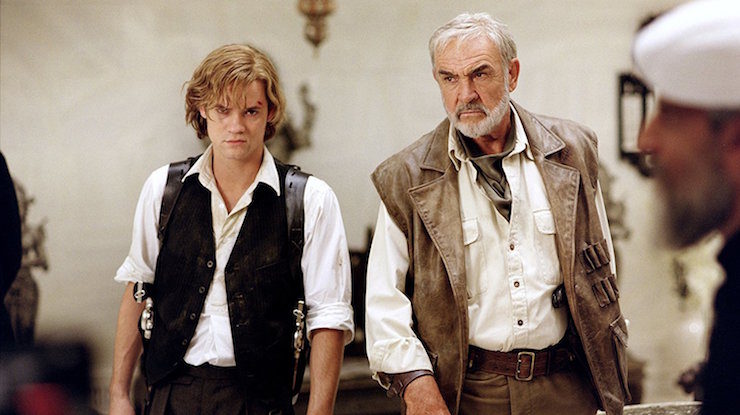
The League of Extraordinary Gentlemen
Written by James Dale Robinson
Directed by Stephen Norrington
Produced by Don Murphy
Original release date: July 11, 2003
A tank drives through the streets of Victorian London, driven by a man in a mask who calls himself the Phantom leading a platoon of German troops. It crashes through a bank, destroying most of it, and making off with cash—and more. Shortly thereafter, the same troops kidnap scientists from Berlin. Tensions between Great Britain and Germany are heightened massively.
Sanderson Reed travels to Kenya to recruit Allan Quatermain to the League of Extraordinary Gentlemen, a commission Quatermain initially refuses. The last time he fought for king and country, his son died. However, he accepts when the Phantom and his men attack the bar he’s drinking in and kills most of the occupants. Reed brings Quatermain to London and introduces him to M, the government operative who has brought the team together, as well as three of his teammates: Nemo, the captain of a technologically advanced ship, the Nautilus; Rodney Skinner (who stole the “invisible man” formula and now is, in fact, invisible unless he wears clothes and makeup), a thief; and Mina Harker, a chemist who is also a vampire. The Phantom is using his technologically advanced weapons to foment chaos and start a war, from which he will profit by selling these fancy-shmancy weapons.
The quartet go to recruit a fifth, Dorian Gray, an immortal. Like Quatermain, Gray is uninterested, but also like Quatermain, he decides to join after the Phantom’s men attack his home. The League is aided by Tom Sawyer, a Secret Service agent who was sent by the American government to help the League stop a world war. Gray doesn’t want him there, but Quatermain likes the cut of his jib, so he lets him in.
They travel to Paris to obtain their final recruit: Dr. Henry Jekyll, who is menacing Paris as Mr. Hyde when they arrive. Quatermain and Sawyer lure him to the Nautilus, and Hyde agrees to behave himself and work with the League in exchange for being allowed to return to London.
M’s information is that the Phantom is attending a meeting of arms dealers in Venice. The Nautilus zips there at top speed. Jekyll notices that a vial of his formula is missing, and he suspects that Skinner has stolen it. Gray and Harker flirt a bit, and Quatermain mentors Sawyer.
Skinner disappears, leaving it to the rest to stop the bombs that have been set underneath Venice. Sawyer drives Nemo’s automobile through Venice (even though the town’s walkways are nowhere near wide enough to accommodate a motor vehicle, especially not one as large as Nemo’s), while Quatermain goes after the Phantom and Harker takes care of the Phantom’s troops. Sawyer gets the car to the spot where the main bomb is, and Nemo is able to fire a rocket at the car’s spot, thus destroying the bomb and saving Venice, though the city itself is unrealistically badly damaged.
Gray then shoots Nemo’s first mate Ishmael (that’s what he said to call him, har har), revealing himself to be the traitor right before he steals the Nautilus’s pod. He’s not the only traitor: Quatermain tracks down the Phantom only to learn that it’s M.
M gets away, but Nemo finds a phonograph that Gray left behind, which explains that M formed the League in order to get samples of Harker’s blood, Jekyll’s formula, and Skinner’s skin, so he can replicate their powers. However, Skinner has also left a message behind: he snuck aboard M’s ship.
However, M only revealed the plan because Gray planted bombs all over the Nautilus, leaving it to sink. However, Jekyll changes into Hyde, whose strength is able to save the ship from sinking, allowing Nemo and his crew to effect repairs.
They follow the pod Gray stole to Mongolia, reuniting with Skinner, who has scouted the factory M has constructed. He’s not only making more of his fancy-pants weapons, but also trying to create soldiers who are invisible, immortal, vampiric, and super-strong.
Skinner plants bombs all around the factory, Nemo and Hyde rescue the scientists, and Quatermain and Sawyer go after M—whom Quatermain realizes is Professor James Moriarty, who somehow survived Reichenbach Falls.
Harker claims Gray for herself. Their fight is difficult, as both are immortal and both heal from all wounds instantly, but Gray was working for Moriarty in order to get his portrait back. Gray stabs Harker in the chest, giving him victory, but then instead of cutting her head off, he takes the sword out, thus allowing her to heal. She unwraps the painting and forces him to look at it, at which point he dies horribly.
Hyde and Nemo manage to free the scientists (and their families, held hostage against their continued work), but are menaced by one of Moriarty’s thugs, who takes an entire vial of Jekyll’s formula, turning him into a much bigger version of Hyde. However, Skinner’s dynamite goes off, and a wall falls on the uber-Hyde. Moriarty almost gets away with the formulae that would allow him to create his super-soldiers, but Sawyer makes a Quatermain-esque shot with his Winchester rifle and kills the bad guy, his formulae falling into the icy waters.
However, Quatermain doesn’t make it out alive, having been stabbed by Moriarty. He’s buried in Kenya, next to his son.
“Maybe you should put some shorts on or something, if you want to keep fighting evil today.”
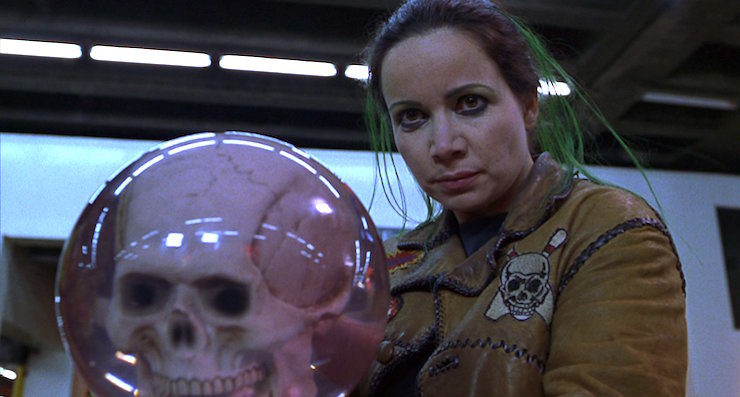
Mystery Men‘s biggest problem was that it was released far too soon. It came out in 1999, before the 21st-century renaissance in superhero movies. If it had been released after the first X-Men movie—ideally, after the first several—then the audience would be primed for it. But satire works best when it’s about something in the public consciousness, and superhero movies—especially superhero team movies—weren’t there yet.
Which is too bad, as the movie is absolutely brilliant. It’s not quite perfect—several cut scenes should have been left in, particularly the one that explained why the Blue Raja doesn’t have any blue in his outfit, and the movie has about four too many characters—but it’s ultimately hilarious. Writer Neil Cuthbert—last seen in this rewatch as the scripter of The Return of Swamp Thing—sensibly eschews the bizarreness of Flaming Carrot Comics for a more direct parody, and it makes the movie more appealing. (Or it should have, anyhow.)
I like the fact that in this world, there really aren’t much by way of super-powers. Captain Amazing’s “powers” are entirely an artifact of his very expensive super-suit. The only real powers we see are pretty low-level—mostly it’s just fancier technology, like the aforementioned super-suit, Casanova’s gadgets, and Heller’s doodads.
I also like the fact that Furious is utterly, totally, thoroughly ineffective until the climax. Up until Monica is kidnapped, Furious not only doesn’t win a fight, he isn’t in any danger of winning a fight. His rage is obviously an act, and he has nothing else going for himself—something he himself realizes when Monica convinces him to be himself. The problem is, “himself” is a loser named Roy who is abused by his boss at the junkyard.
In general, the movie is perfectly cast, starting with Greg Kinnear and his sleazy chiseled jaw as Amazing. There are few better suited to playing a scummy, supercilious version of Superman, and Kinnear absolutely nails it. William H. Macy and Hank Azaria are never not wonderful, and they imbue Shoveler and Raja with tremendous heart, making them people, not just caricatures. Ben Stiller’s range could charitably be called limited, but Furious plays right into that tiny range perfectly, making this one of the few performances Stiller has given that doesn’t make me want to punch him in the throat. The only time he’s really irritating is when he and Jeaneane Garofalo’s Bowler argue, as those moments are endless and tiresome and poorly played. Garofalo is excellent otherwise, though.
The best performance in the movie, though, is Tom Waits. One of my favorite singer/songwriters, Waits is also a tremendous actor (his lack of any kind of award consideration for his role as Mr. Nick in The Imaginarium of Dr. Parnassus is, frankly, a crime against humanity), and his goofy enthusiasm as Heller is stupendous. I particularly like the fact that he insists that all his gadgets be non-lethal, and I only wish the alleged superheroes were more on board with that notion. (As it is, two of the bad guys are out-and-out killed by the heroes, which is irritatingly non-heroic behavior.)
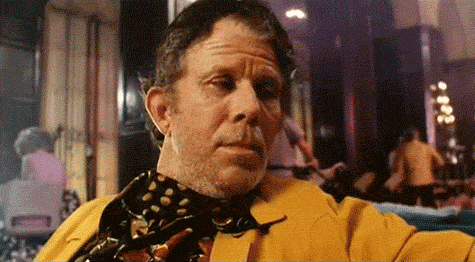
Still, this is one of the great superhero movies of all time because it so delightfully subverts the genre. But it needed to come out after that genre became the hottest thing since sliced bread.
The League of Extraordinary Gentlemen needed a lot more help to be successful. Pretty much every change from the comic that was made for non-legal reasons were bad ones. The two legal ones—changing the Invisible Man and removing Fu Manchu—were both fine. The former was replaced with Tony Curran’s Skinner, who is one of the best characters in the movie, and the latter is a rather yucky stereotype that the movie was better off avoiding.
No, the issues were all the other changes: Making Harker a vampire, and also a secondary character—she’s more or less the main character, along with Quatermain, in the comics—is a disservice, and Peta Wilson—who was superb in the title role in the USA TV series La Femme Nikita—is undercooked here to a surprising degree for someone who’s supposed to be a vampire. Re-casting Dorian Gray as a bored immortal doesn’t entirely work, nor does having him be an unrepentant villain (it doesn’t help that Stuart Townsend doesn’t really have the chops to elevate the role beyond the don’t-hate-me-because-I’m-beautiful mode that is all the script provides). Tom Sawyer adds nothing to the movie—it was done so there’d be an American, which was pointless, especially since there’s no relationship between Mark Twain’s character and this person.
Worse, because Sawyer and Quatermain are thrown together for most of the movie, we’re denied the much more interesting pairing of Quatermain with Naseeruddin Shah’s regally dignified Nemo. (Their exchange on Nautilus is delightful: “I may have been overly rude, earlier, when I called you a pirate.” “And I may have been overly charitable when I said I wasn’t.” The movie needed more of that, not less.)
Sean Connery’s Quatermain is, at least, well played, as Connery does a beautiful job with both the character’s confident competence and his exhaustion and aging. Ditto Jason Flemyng, who absolutely nails both Jekyll’s tortured anguish and Hyde’s brutality, as well as the nobility buried beneath all that in both iterations. And, as stated above, Curran’s Skinner is spectacular.
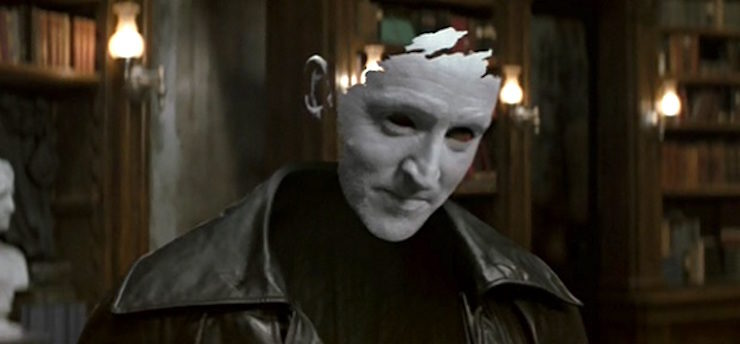
The same cannot be said for our bad guy. I’m still waiting for Richard Roxburgh to give a good performance, and this sure as heck ain’t it. Although it is fitting that one of the worst antagonists in literature is played so poorly. (Seriously, “The Adventure of the Final Problem” is, quite possibly, the worst story in the English language, and I say that as a huge fan of pretty much all the other Sir Arthur Conan Doyle stories about Sherlock Holmes. It boggles my mind that so many people insist on using Moriarty when telling a Holmes story, as he’s a minor, irrelevant character, unconvincingly crowbarred into the canon to attempt to provide a “worthy” opponent to kill Holmes, at which Conan Doyle failed on every possible level, both artistically and story-wise, as he wound up being forced to bring Holmes back. Moriarty isn’t a character, he’s a plot device, and not a very good one, and every use of him automatically diminishes the work he appears in.)
But the biggest problem with LEG is that the action scenes are big and obnoxious and endless and boring and just too much. They’re overstuffed and overlong, and not that interesting. Rather than move the film along, they grind the story to a halt so we can have multiple gunshots, tons of gratuitous destruction (they pretty much demolish Venice), an endless supply of redshirt thugs to surround Moriarty and bats to surround Harker, and it’s a mess. The only fight that actually works in the entire movie is the insta-healing duel between Gray and Harker. (Gray’s bemused lament, “We’ll be at this all day” is pretty much the only good line reading Townsend provides.)
The second biggest problem is that there is very little sense of fun in this movie, and pretty much all of it comes from Curran’s snarky line readings as Skinner. This should be a romp, a fun teaming of literary giants, but not enough of the original characters shine through to provide that, and the movie winds up falling flat because of it.
Both these attempts to do a team superhero movie failed with audiences, but only one was a justifiable failure. One hopes that the rumored reboot of LEG will do better.
Next week, we’ll look at two single-hero films of the 1990s, Steel and Spawn.
Keith R.A. DeCandido hopes everyone had a wonderful holiday, and looks forward to continuing this rewatch into 2018. He also urges folks to check out his Patreon, where you can get cat photos, regular TV and movie reviews (he’s reviewed Star Wars: The Last Jedi, Marvel’s Agents of S.H.I.E.L.D., MacGyver, and The Librarians), excerpts from his upcoming fiction works, exclusive original vignettes featuring his original characters, and more niftiness.










